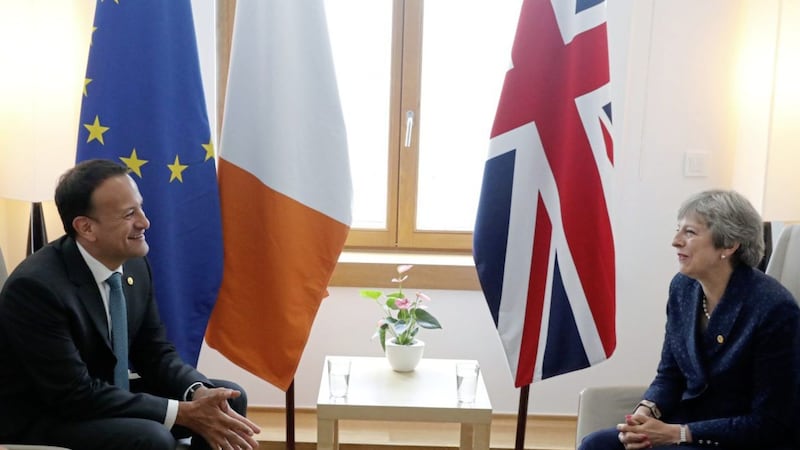HAVING grown up against a background of resounding political rhetoric about the Border, I find it hard not to be sceptical regarding more recent pronouncements on the question at European level, in the context of Brexit.
When I was a small boy, partition was the most talked-about issue in Irish politics.
The Border Campaign of the IRA was at its height and I have a clear memory of the night a republican funeral made its way slowly through our village in County Wexford.
Although it was darkest winter, there was a vivid, near-mystical light around the coffin, which came from the candles the mourners were carrying.
Patrick Parle was only 27 but this was his final journey home to Wexford Town. A typesetter and fluent Irish-speaker, he was one of five men killed when explosives detonated prematurely at 12.50am on November 11 1957, in a cottage overlooking the Border at Edentubber, Co Louth.
Four of the victims, aged 19 to 29 years, were described as IRA members and the cottage-owner, 50-year-old Michael Watters, also died.
No doubt the republicans were inspired by the rhetoric of the time, reflected in the funeral oration for the other Wexford man among them, George Keegan.
Republican lawyer Myles Shevlin told mourners at Enniscorthy that "there can be no real monument but the realisation of the dream of freedom for which he died - an Irish Republic, free, unfettered and independent".
All those years later, the Border still exists, albeit in less-visible form than in the days when customs posts were a prominent feature - and a favoured target for activists, including the Edentubber group who were apparently planning to put their own mark on Armistice Day.
I wasn't expecting to see Nigel Farage in the vicinity of the Summit: it was like meeting Jim Allister at a Sinn Féin ard fheis or Mary Lou McDonald attending a conference of the TUV
Now the Border is a European issue and at last week's EU Summit in Brussels I listened to Dutch Prime Minister Mark Rutte, for example, telling the media: "I believe the first, second and third priority now is to solve this issue of the Irish border and, when that is solved, then so many other issues will be easier to discuss."
I wasn't expecting to see Nigel Farage in the vicinity of the Summit: it was like meeting Jim Allister at a Sinn Féin ard fheis or Mary Lou McDonald attending a conference of the TUV.
Blaming the EU's chief negotiator on Brexit, Michel Barnier, for making the Border an issue, Farage told me: "Nobody in the Brexit camp had ever raised the possibility of a hard border. Fascinatingly, nobody in the Remain camp had ever raised the possibility of a hard border.
"Monsieur Barnier raised the issue of a hard border and has tried to make it a stick with which he beats the British and gets them to stay aligned to single-market rules and all the things the [majority] voted against in the referendum."
He pointed out that there was already a hard border in terms of currency, tax rates and VAT regimes.
I hadn't heard Farage talking about the peace process before, but he went on to speak of "the astonishing achievements of the last 20 years between the United Kingdom and the Republic of Ireland in terms of our relationship with each other".
In view of the fact that British-Irish tensions had "gone down so phenomenally", he said the two governments should issue a joint appeal to Brussels as follows: "Look, whatever happens in the future, there has to be a tariff-free deal between the Republic and the United Kingdom."
Some time back, we were being told the Border issue might be resolved by the end of June, but it has been kicked forward to the next summit in mid-October.
Former taoiseach Bertie Ahern has warned of the danger that Irish interests will be sacrificed during the political equivalent of a Hallowe'en party.
One of his former ministers, Dermot Ahern (no relation), has expressed similar fears. In his Daily Mail column on May 5, he recalled attending a summit in 2005 where a proposal to initiate talks with Turkey on accession to the EU was being opposed by Cyprus.
"Ultimately at 5am the following morning the Cypriot foreign minister, in tears, capitulated," he wrote.
I don't know how many republican funerals there have been since I caught sight of Patrick Parle's cortege that November night long ago but they must number in thousands, to say nothing of similar ceremonies involving loyalists, security-force personnel and other victims of political violence.
All of them were directly or indirectly related to the existence of the Border and the conflict arising out of it.
Therefore, it defies common sense to put structures in place that heighten the obtrusive symbolism of that particular dividing line.
Flexibility and creativity from London, Brussels and Dublin are required. Given how high the stakes are, it's not too much to ask.








